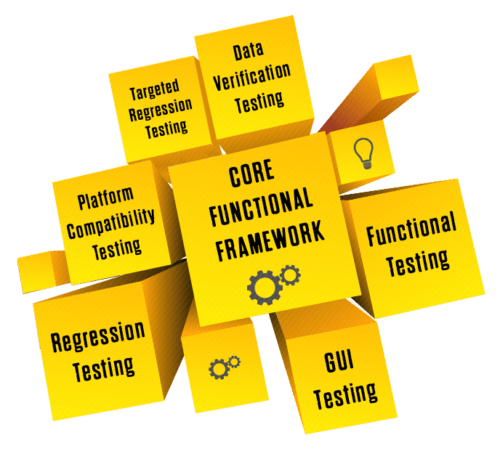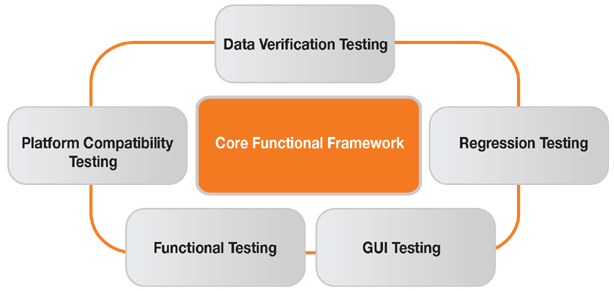Does your software do what it’s supposed to do?
Are all core functions present and accounted for? Do they work as intended? Functionality in software engineering is ensuring that what you’ve designed performs as you expect. It is the purpose of functional testing — and is critical for any newly created software or application.
XBOSoft’s application functional testing services give you peace of mind that your software doesn’t just work, but does what your users want and also meets the expected outputs. Using our functional testing framework and best practices, we thoroughly cover all crucial areas of functionality, from UI and system testing, to platform compatibility.
Functional Testing Services
Functional software testing covers a broad range of solution functionality, including:
Functionality testing
Application functional testing is the foundation from which software quality follows. Without core functionality, your software will never meet user needs. XBOSoft transforms requirements into test cases by utilizing best practice test case design. This includes databases, install/config, upgrade, and networking features and ensures a solid foundation for quality assurance and your software deployment.
User interface (UI) testing
This type of testing is critical because features are useless if users can’t figure them out. Can users of varying skill levels easily access and use the application? UI testing for web applications is especially critical where poor usability or slow performance can lead to user dissatisfaction, even when there are no defects.
API Testing
These days, with software development lifecycles being so short and the usage of third-party modules and interfaces on the rise, it’s important to get ahead of the curve. Testing APIs assures that all the data being accessed is properly processed by the API, ensuring better security and compliance testing. Lastly, because API testing occurs prior to any black-box UI related testing, every API defect found may save up to 10 GUI defects later in the project! Test APIs expected outputs with each build and release. If the APIs don’t work, not much will.
Data verification testing
Is data handled consistently throughout your application? For data verification testing, XBOSoft’s testing model is divided into three major components resembling the Extract, Transform, and Load paradigm. Our testing ensures that data, calculations and formulas are consistent throughout the application.
Regression Testing
Software development and features planned and released are in a constant state of flux. This type of application functional testing uses a strategy customized to your software’s feature set, release schedule, and risk profile to ensure that new changes don’t impact existing functions while ensuring maximum coverage Platform and user compatibility — Firefox. Internet Explorer and Safari. Your software needs to work equally well across each, but browser compatibility goes deeper: Does your application perform similarly for users with different browser versions? What about those using different languages? While most apps are still designed to run in a Windows or Mac OS desktop environment, you can’t ignore other operating systems like Linux and Solaris. And with more business users and consumers now opting for mobile devices, it’s not enough to simply re-skin desktop software as “mobile-friendly” — your applications need to work equally well on iOS, Androids, and other mobile operating systems. With regression testing, you’ll know how and when to use a multiparameter matrix approach to identify potential areas of concern can be extremely useful.
User acceptance testing
User Acceptance testing is the final Q&A step emulating real-world usage conditions before a software application is released to end-users. These tests are not usually focused on identifying simple problems such as spelling errors and cosmetic problems, nor show stopper defects such as software crashes which should have been fixed during earlier unit level testing phases. Acceptance tests are black-box system-level tests whereby each test represents some expected result from the system given a predefined set of test scenarios of an end-user carrying out their daily usage or process with documented expected results combined with pass/fail criteria. Are expected functions and shortcuts available to users? Do they feel that the application meets their expectations? Acceptance testing ensures you’ve hit the mark from a quality assurance perspective.
Our Functional Testing Methodology
At XBOSoft, we’ve chosen a functional testing design methodology to provide the broadest base possible and solid yet flexible framework for software evaluation and functionality in software engineering. By leveraging various tools and platforms, we ensure that your applications experience the same challenges in a testing environment they will encounter in the wild.
This foundation, combined with our structured test methodology, includes:
Test Strategy, Planning, and Control
Systematically evaluate risk and priorities to ensure effort is put in the right places. Develop a test plan for what should be tested, when, and with what resources. From unit testing through system testing, it’s important to have quality assurance covered from a big-picture perspective.
Test Preparation and Specification
With a test strategy and test plan in hand (see above), one can develop a test specification, including the test infrastructure, test environment, user scenarios, and test cases. This includes specific test plans that allocate the proper techniques and test case development strategies based on the master test plan with user scenarios and test cases specifically designed per quality property and identified risks. XBOSoft works with clients to develop test cases in a systematic and hierarchical manner so that they can be organized, queried, and used at the right time for acceptance, regression, or for specific functions or scenarios.
Test Evaluation and Improvement
The software testing life cycle must do more than find defects at the end of the QA software development cycle. Using a proven methodology known as TPI, or Test Process Improvement, QA teams can drive software process improvement by quickly identifying defects in production and enabling higher productivity throughout the entire test process. An integral part of TPI is the application of process engineering methodologies to evaluate testing maturity. This improvement strategy consists of 16 key evaluation areas, including Test Strategy, Agile Test Process Management, Test Methodology, Test Metrics, Test Case Design, and Defect Management.
Functional testing is an integral part of developing high-quality software and applications. Contact XBOSoft today to empower your testing and get ahead of development cycles.





